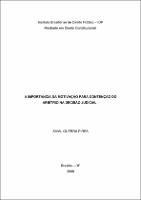Use este identificador para citar ou linkar para este item:
https://repositorio.idp.edu.br//handle/123456789/90| Título: | A importância da motivação para contenção do arbitrio na decisão judicial |
| Autor(es): | Pires, Sival Guerra |
| Orientador(es): | Coelho, Inocêncio Mártires |
| Palavras-chave: | Racionalidade;Legitimidade;Decisão Judicial;Motivação Judicial;Sentença Judicial |
| Data de submissão: | 2008 |
| Citação: | PIRES, Sival Guerra. A importância da motivação para contenção do arbítrio na decisão judicial. 2012. 184 f. Dissertação (Mestrado). - Instituto Brasiliense de Direito Público, Brasília, 2008. |
| Resumo: | A motivacao das decisoes judiciais configura-se como uma prestação de contas do juiz acerca da investidura que, no Estado Democratico de Direito, e-lhe conferida pelo povo, verdadeiro titular da jurisdicao. Tal dever ― que para o jurisdicionado e direito e garantia fundamental ― implica necessidade de que, para atuar valida e legitimamente, as decisoes dos casos concretos sejam acompanhadas do pronunciamento das razoes determinantes da respectiva deliberacao, com a pretensao de convencimento do auditorio. Nesse ambito da atividade jurisdicional, em que se conjugam a interpretacao-aplicacao de normas objetivas e a subjetividade do julgador, coloca-se a complexa pretensao de se conter o arbitrio no ato de julgar, em especial a prolacao de decisorios sem conexao com as regras, principios e valores ― explicitos e implicitos ― do sistema juridico. Frente a essas inferencias, a vista das contundentes criticas doutrinarias, dirigida aos juizes, pertinentes a mitigação da exigencia de motivar, propos-se nesta dissertacao perquirir a relevância pratica daquele imperativo constitucional (artigo 93,IX) para o fim de se obstacularizarem decisoes judiciais de cunho puramente voluntarista. A partir de analises acerca de aspectos estruturais da motivacao, da explicitacao de suas multiplas funcoes (extraprocessuais e endoprocessuais), de seus nexos com o intento de se repelirem comportamentos ilegitimos do julgador, avaliouse ― pressupondo racionalidade no exercicio da atividade judicante ― a respeito da importancia daquele instituto sob os angulos da necessidade, suficiencia e eficacia. Assim, considerando reflexoes da doutrina e jurisprudencia, concluiu-se que a concretizacao da mencionada exigencia de justificacao e imprescindivel para repelir manifestacoes de arbitrios decisorios, assim como se constatou, em decorrencia das particularidades inerentes ao processo interpretativo-aplicativo, que aquela nao e bastante para se garantir inexoravelmente os resultados previstos, tendo eficacia apenas relativa ou potencial. Alem disso, nao obstante o reconhecimento de suas limitacoes e a falta de conscientizacao mais difusa sobre sua importancia como anteparo ao arbitrio judicial – inclusive entre os operadores do Direito –, evidenciou-se tratar-se de mecanismo cuja efetividade constitui condicao insubstituivel a racionalidade, validade e legitimidade dos julgamentos proferidos pelos órgãos jurisdicionais |
| Abstract: | The motivation of court decisions, sets itself as a reporting requirement of the judge, about the investiture that in the democratic state of law, is given to him by the people, the true titleholder of the jurisdiction. Such duty – that, to the citizen, constitutes a right, and a fundamental guarantee - involves the need that, in order to act as valid and legitimate, in the decisions of concrete cases, those must be followed by the pronouncement of the determinant reasons of the respective deliberation, with the intention of convincing the auditorium. In this ambit of the jurisdictional activity, in which the interpretation-application of objective norms and the judge's subjectivity, involves the complex pretension of contain the use of free will in the act of judging, especially the delivery of decisions without connection with rules, principles and values – explicit and implicit – of the legal system. Face these inferences, in sight of the severe doctrinaire criticism, directed to the judges, pertinent to the mitigation of the demand of motivating, it is proposed in this dissertation to investigate the practical relevance of that constitutional imperative (item 93, IX, C.R.), so as to create obstacles to merely volunteering law decisions. From analysis about structural aspects of motivation, the exposure of its multiple functions (extra-procedurals and endo-procedurals), of its nexus with the intention of repelling the judges illegitimate behaviours, it has been examined – assuming rationality in the practice of the judging activity – about the importance of that established institute by the angles of necessity, sufficiency and effectiveness. Thus, considering reflections of the doctrine and jurisprudence, it has been assumed that the achieving of the mentioned demand of justification is essential to repel manifestations of arbitrary decisions, as confirmed, due to the inherent particularities to the interpretative-applicativeprocess, that the same is not enough to have the inexorably desirable results, with only relative, or potential effectiveness. Besides that, notwithstanding the recognition of their limitations and lack of more diffuse awareness of the importance as a shield against the judge's will – including the law operators – it has been found that it is a mechanism whose effectiveness makes an irreplaceable condition to rationality, validity and legitimacy of the decisions and judgements pronounced by law courts |
| Descrição: | Dissertação apresentada ao Programa de Mestrado do Instituto Brasiliense de Direito Público – IDP como parte dos requisitos para obtenção do título de mestre. |
| URI: | https://repositorio.idp.edu.br/123456789/90 |
| Aparece nas coleções: | Mestrado Acadêmico em Direito Constitucional |
Arquivos associados a este item:
| Arquivo | Descrição | Tamanho | Formato | |
|---|---|---|---|---|
| dissertação_Sival Guerra Pires.pdf | 857.56 kB | Adobe PDF |  Visualizar/Abrir |
Os itens no repositório estão protegidos por copyright, com todos os direitos reservados, salvo quando é indicado o contrário.
